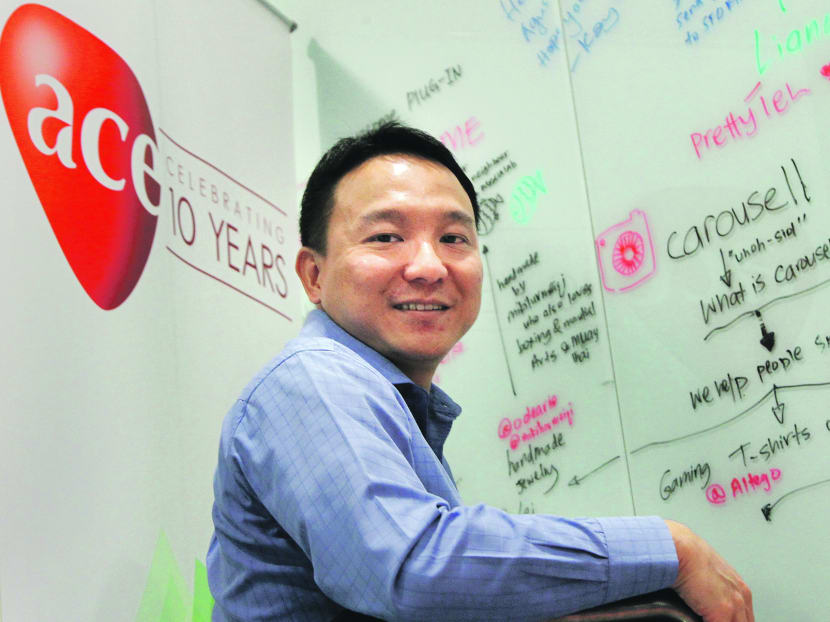Supersizing the start-up

QuestVC co-founder James Tan feels firms need to move out of their comfort zone to succeed. Photo: Don Wong
SINGAPORE — At about the time venture capitalist James Tan was urging the Government to provide more early-stage funding to support local start-ups during this interview with TODAY, Deputy Prime Minister Teo Chee Hean was announcing plans in another part of town to do just that.
Insufficient “Series A” funding —which takes place after a company’s initial seed financing and is its first significant round of funding — has been a big stumbling block to the growth of start-ups here.
“After raising seed funding of, say, S$50,000, it won’t be long before the firm will need to raise (money) again and, currently, not many people are providing the S$1 million-plus level of funding,” said Mr Tan, co-founder and Managing Partner of QuestVC.
That may change after Mr Teo announced at an industry conference last week the Government’s intention to set aside an additional S$50 million to encourage venture-capital firms to invest in local companies.
But it will take more than money for Singapore to produce the next Google or Facebook, argued Mr Tan. Unwilling to break out of their comfort zone in Singapore, many start-ups fail to think big and move into large markets, such as China or the United States.
Mr Tan should know what he’s talking about. In 2010, after graduating from Tsinghua University in Beijing, the Singaporean co-founded an online daily-deals site in China. The firm, 55Tuan, has since expanded — organically and through acquisitions — to almost 4,000 staff across 150 cities.
“If you are in the Internet space, and are not immediately thinking of a large market, you are setting yourself up for failure. There is no difference between an app created in the US and one designed in China or Singapore,” he explained.
The one exception is if the product
or service being offered is “hyper-local”, such as an app that provides information only on restaurants in Singapore, which makes it difficult for outsiders to replicate.
“And when companies do think of venturing abroad, it is usually to neighbouring countries Malaysia and Indonesia. We tend to get sucked into our own part of the world, but I’m starting to see more people (who are) prepared to shift out of their comfort zone,” he said.
In 2011, Mr Tan co-founded QuestVC, a Beijing-based venture-capital firm that invests in Chinese tech start-ups or Singaporean ones with a strong China focus.
One of its investments is in the local company behind Burpple, a food-related social media app which offers its services in China.
In December last year, the firm was named one of the Top 10 Start-ups in Asia at the Open Web Asia event in Haikou, China.
For many local start-ups that have ventured into the country, however, the experience has been brutal, with challenges ranging from language and cultural barriers to being unprepared for the intense competition from domestic rivals. Many Singaporeans have exited the Chinese market with a bitter taste in their mouths, revealed Mr Tan.
To help ease the entry of Singaporean firms into the country, Mr Tan helped set up the Beijing chapter of The Action Community for Entrepreneurship (ACE) last year. ACE is a private- and public-sector initiative established 10 years ago to seed and nurture start-ups in Singapore.
About 30 Beijing-based Singaporeans work in various committees to provide advice, networking opportunities and funding to start-ups there, said Mr Tan, the chapter’s Chair. A group of Chinese entrepreneurs has also been roped in to act as mentors.
The end game, said Mr Tan, is to produce a handful of Singaporean firms that can shine on the global stage — something that has not happened since Creative Technology was the undisputed leader in computer sound cards in the 1990s.
To that end, start-ups need to look beyond just being able to survive and towards an exit strategy.
“Start-ups are not thinking of the exit as much as they should. They are just happy to get going and generate some monthly income. But they should be thinking, ‘If I keep doing this, will I grow to a stage where I will become attractive to Google?’,” said Mr Tan.








